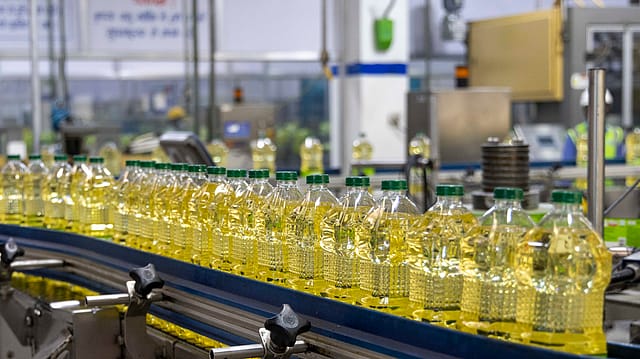Adani Wilmar, Ruchi Soya shares fall despite tax waiver on edible oil; here’s why
ADVERTISEMENT

Shares of Adani Wilmar (AWL) and Ruchi Soya Industries declined 5% each on Wednesday even after the government announced an import duty cut on soyabean and sunflower oils to combat rising food inflation. The stock price of other edible oil companies such as Manorama Industries, Modi Naturals, Gokul Agro, Marico, Ajanta Soya also fell up to 5% on the BSE amid volatile sentiment in the broader indices.
Shares of Adani Wilmar were locked in the 5% lower circuit for the second straight session at ₹664.95 apiece, against the previous closing price of ₹699.90 on the BSE. The Adani group stock has fallen 10% in two sessions, while it rose 4.5% in a week. In the last one month, the largecap stock has fallen more than 13%, as compared to a 4.7% decline in BSE Sensex.
Similarly, Ruchi Soya share price also hit a 5% lower circuit of ₹1,045.45 on the BSE. The stock of Patanjali Ayurved-owned company has been falling for the last three sessions and has dropped 14.3% during this period.
The government on Tuesday scrapped customs duty and agriculture infrastructure development cess on the import of crude soyabean oil and crude sunflower oil to curb the rising edible oil prices, which are fanning the food inflation. As per a notification from the ministry of finance, import of 20 lakh metic tonne (MT) each of crude soyabean oil and crude sunflower per year will remain duty free for a period of two years.
The duty waiver on import of soyabean and sunflower oil is likely to bring down edible oil prices, which surged to record high in recent past due to conflict between Russia and Ukraine, which are one of the key producers. The four key edible oils including palm, soya, mustard and sunflower constitute 85-88% of the total consumption in India in terms of volume. Palm oil is primarily used by large-scale food processing enterprises, while soybean oil, mustard oil and sunflower oil are largely used for domestic consumption.
Adani Wilmar and Ruchi Soya are the largest players in branded oil business, contributing 12% and 6%, respectively, in total oil consumption of 22MT in India. The combined share of the top six players in branded oil business (Adani Wilmar, Ruchi Soya, Emami, Cargill, Bunge and Marico) has been estimated at around 40% in FY20.
In a separate development, Indonesia, the world’s largest palm oil producer, has announced to lift its ban on palm oil exports following improvement in domestic supply. Palm oil imports account for more than half of India’s total imports in the vegetable oil segment. Indonesia supplies more than half of India’s edible oil imports.
Earlier this week, the government took a slew of measures to control the rising inflation in the economy, including excise duty cuts on petrol and diesel, raised tariff on steel exports, banned wheat and sugar exports. India’s retail inflation rate in April soared to an eight year high at 7.79% over 4.23% in the same month of the previous year fuelled by the high prices of vegetables and oils. Also, the food inflation rate in the month of April soared to 8.38% compared with 1.96% in the same month of the previous financial year.
It may be noted that the inflation rate in oils and fat in April zoomed to 17.28% on account of high edible oils in April 22 vs April last year, while vegetable prices have gone up by 15.41%. The Russian invasion on Ukraine has stoked a price spiral in the edible oil due to supply disruption as Ukraine has been a major supplier of sunflower oil.